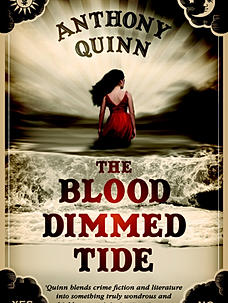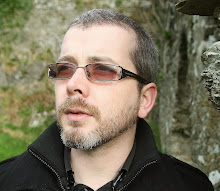Thursday, 26 November 2015
Guest Post - Anthony J. Quinn
I'm very much a believer in writing first and researching later. The danger of writing historical fiction is that as a writer you run the risk of disappearing down a wormhole into another era, never making it back with a clear-cut, compelling tale to relate. I've been obsessed with WB Yeats and the Sligo setting for years, as well as Michael Collins and his role in the War of Independence, and the temptation was to succumb to excess and include a rich tapestry of historical minutia.
However, writing historical fiction, especially a mystery story, should be like steering a boat with a leak in high seas. Many loved items have to be chucked overboard with every page you write. Amusing anecdotes and fascinating details that don't animate your principal characters and move the plot along have to be discarded with impunity.
That sense of urgency which comes with keeping the literary boat from capsizing at all costs is a protection against procrastination and getting lost in the past.
A guilty feeling of transgression haunted me during the writing of both The Blood Dimmed Tide and Blind Arrows. I worried that I might be doing some of Ireland's most famous historical characters a great disservice in entangling them in plots involving ghosts, spies, smugglers, corrupt policemen and 'lust murderers'.
In regards to Yeats, his life and his work, have been obsessions of mine since early adolescence, and the story about his fascination with spirits and his strange relationship with his wife Georgie was irresistible. It surprised me that no one in literature, drama or film has given his life a fictional treatment or tried to transpose his supernatural investigations into a mystery tale.
However, Yeats has been much derided for his 'creepy' obsession with the supernatural, and his interest in the magical powers that might be acquired through esoteric knowledge has alarmed many literary critics over the years. It eased my conscience to think that I was at least portraying this side of his character sympathetically. This was what I promised WB Yeats at the start of writing The Blood Dimmed Tide. Whether or not I delivered is another matter.
I hope I am saved by the fact that many of Yeats' friends found him unknowable. Irish writer Sean O'Faolain famously said of him: "There was no Yeats. I watched him invent himself." In that sense, he is impossible to capture within the covers of a biography, which is a great problem for his biographers, but a golden opportunity for a novelist.
Yeats will always remain an enigma. He was one of a group of extraordinary and mesmerising figures that made London at the turn of the century an emporium of exotic cults and psychic societies. He was the closest thing we have to a supernatural sleuth, always seeking answers, always probing the evidence before him, always odd and unpredictable in his behaviour - which I hope makes him the perfect hero for a mystery story, especially one that involves ghosts, spies, smugglers and corrupt policemen.
Writing about Michael Collins in Blind Arrows, I wanted to give a more nuanced depiction of him and his role in the War of Independence. Neil Jordan and Liam Neeson's film portrayal was so captivating with Collins depicted as a John Wayne style hero, that I struggled to keep Collins from overtaking the book and dominating all the scenes that mentioned him.
Lastly a word about Silence, the third in the Celcius Daly series, which was published on November 5. It's the most important and ambitious book that I've written. I've always tried to write about the Troubles in oblique and unexpected ways, wrapping up that very dark material in what I hope are entertaining crime thriller plots, the conventions of which have helped me excavate some very haunting personal experiences. In Silence, I found the subject matter so disturbing that I wanted to run away from it many times, but I'm glad that I stuck with it. Already, the Sunday Times has called Silence 'a masterful meditation on the corrosive legacy of the Troubles', and the Sunday Express has picked it as one of the best crime books of the season. It's great to see fiction so rooted in the Tyrone and Armagh landscapes, and its people, praised by the big London newspapers.
Subscribe to:
Post Comments (Atom)








No comments:
Post a Comment